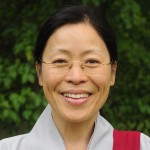Teachings
Wisdom by Namhee Chon JDPSN
 What is wisdom? Is wisdom something that we can attain? Or is it our inherent original nature that we only need to return to?
What is wisdom? Is wisdom something that we can attain? Or is it our inherent original nature that we only need to return to?
Zen Master Lin Chi says if you meet the Buddha, kill the Buddha. With his dramatic statement he is urging us not to create something in our mind, not even “not Buddha,” and not to become a slave of our thinking. It is the same with wisdom. Once we have an idea of the perfection of wisdom (prajna paramita), we strive to attain it using every possible means. Are we aware where this idea of perfection of wisdom comes from? Where can we look for this wisdom? If it is outside of us, where is it? If it is inside of us, where is it to be found? There is nothing either outside or inside of us that we call wisdom. Yet it appears spontaneously as an answer to a question, situation or problem. So it seems not to be something static, but rather a dynamic response to a concrete situation. What can we do in order that this dynamic response can appear unhindered?
As soon as we think of perfection, the idea of no perfection appears in our mind. Yet we cannot even say definitely what perfection is. We only can declare what is no perfection. So what do we do? “Kill” the idea of the perfection of wisdom in order to go beyond this dualistic thinking? What happens, if we let go of any kind of ideas like wisdom and perfection completely? The mind before thinking reveals itself. Out of this before-thinking mind all wisdom actions appear spontaneously, moment by moment, like a tree responding to the wind with rustling leaves. What is the way to live according to that? Zen Master Lin Chi says again: “Followers of the way, the dharma of the Buddhas calls for no special undertakings. Just act ordinary, without trying to do anything in particular. Move your bowels, piss, get dressed, eat your rice, and if you get tired, then lie down.” This “without trying to do anything in particular” makes the ordinary acts extraordinary! It is indeed more a matter of how we are doing something than what we are doing: drop all ideas and just do it!
Recently I was teaching in a retreat. There was one woman and one man who did not like each other. Both of them were sincere and dedicated Zen practitioners and worked in this retreat as head dharma teacher and kitchen master. The kitchen master, a twenty-year-old young woman, said, “The head dharma teacher hates me. He is looking at me always critically and stern. He is like my mother, looking grim and rigid. This kind of person makes my life so sad.” The head dharma teacher, who was in his fifties, and in fact usually very kind outside retreats, complained, “The kitchen master is selfish and arrogant, exactly like my daughter. I cannot bear this kind of person.” Since they came together for the first time to this retreat from different countries and never talked much because of the rule of silence that we practice during retreats, it is hard to say they knew each other well. Yet they were suffering due to their strong negative feelings toward each other.
Like in this story, we unconsciously make pictures of others or ourselves according to our ideas or past experiences. The consequence is that we suffer and blame others for our suffering. But once we notice that we are trapped in our own thinking and it causes us suffering, we get to know the nature of all problems. This thinking makes us act and react in a conditioned and predictable way, so we end up repeating the same behavioral pattern, which we call karma. The karmic acts of comparing, judging and assuming hinder us in perceiving the uniqueness of the very moment and the person with whom we interact. The incomparable uniqueness of this very moment can reveal itself only when the attachment to thinking stops. As Zen Master Seung Sahn says, our mind becomes then like a mirror, clear like space. Red comes, it reflects only red, and yellow comes, only yellow. That means, red doesn’t have to become yellow and yellow does not need to be changed into red. And also yellow itself is enough and complete without depending on red at all. Only out of this hundred-percent mirrorlike mind can clear action appear. The above-mentioned kitchen master wrote me a short message soon after our talk: “Now I understand. The problem is not between the head dharma teacher and me. The problem is that we are following our karma. He is OK. I am OK.” This OK-mind is the seed out of which great love and great compassion mind emerge. The other name for this is supreme wisdom or prajna paramita. Without attachment to thinking our mind can perceive clearly. Then it is possible to just do it for all beings without distinction.

